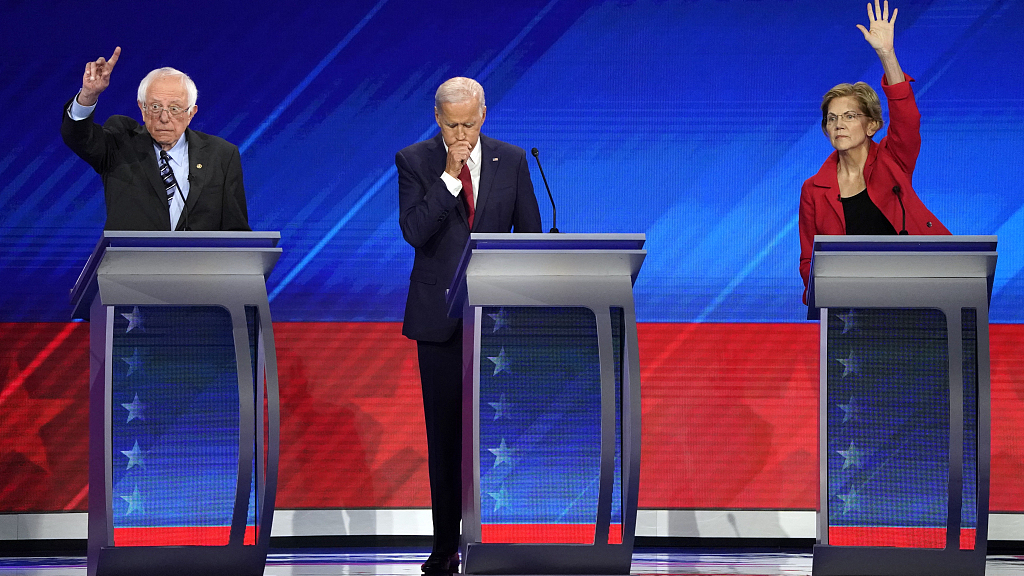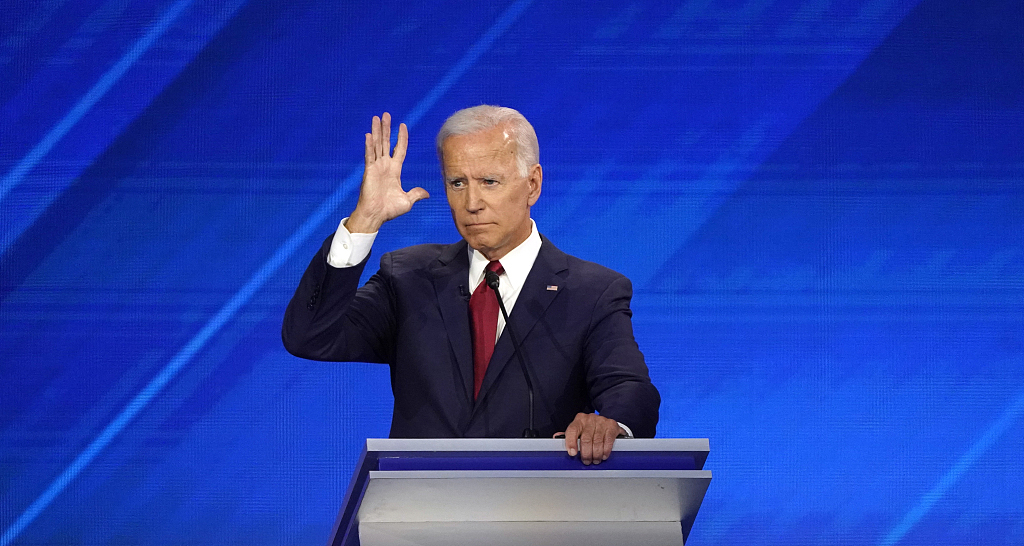

Editor's note: Tom Fowdy is a British political and international relations analyst and a graduate of Durham and Oxford universities. He writes on topics pertaining to China, the DPRK, Britain and the U.S. The article reflects the author's opinions and not necessarily the views of CGTN.
September 12 saw candidates for the U.S. Democratic Party's bid for President of the United States square off in their third debate in Houston, Texas. Front-runners Joe Biden, Elizabeth Warren and Bernie Sanders contended with each other on a number of issues, including foreign policy, environment, climate change and the economy, while outsider voices such as Cory Brooker, Beto O'Rourke, Pete Buttigieg, Julian Castro and Andrew Yang sought to make a breakthrough and appeal to voters.
Inevitably, one of the topics that emerged in the debate was the matter of the U.S.' China policy, an issue that has become one of the leading foreign policy issues in the country due to Trump's proactive trade war against Beijing. For an aspiring president, it is of such a magnitude that it is impossible to ignore.
Responding to questions on China, the candidates notably lashed out at Trump's trade war, branding it reckless, irresponsible and detrimental to American business. However, when asked specifically what they would do in his place, they seemed somewhat more sympathetic to the president's motives but nevertheless as a whole edged towards the conclusion that a deal should be secured, albeit with changes from Beijing.
Is this a turning point in American electoral politics concerning China? For the sheer part of a year, the shift in Washington against Beijing has been bipartisan with senior figures in both parties offering Trump pure and uncritical support for getting "tough."

Former vice president Joe Biden gestures during the 2020 Democratic U.S. presidential debate in Houston, Texas, U.S. Sept 12, 2019. /VCG Photo
The debate however suggests a small, but incremental shift: There is now political capital available for attacking Trump over the economy, of which the trade war has been massively detrimental too. However, as the rest of the debate has shown this did not change the new perception that America should "compete" with Beijing, or for that matter the "China threat" mindset, some of the candidates in turn may prove to be more cautious, but little different in practice.
As has been frequently pointed out, criticism of Trump's handling of the economy and where the trade war is leading it is growing in the United States. While Trump has received a political free pass on his China policy, as talk abounds of a slowdown and recession, it is becoming impossible and perhaps negligent for opposing politicians to ignore, especially when there are votes to be won.
For Bernie Sanders, "Trump obviously, hasn't a clue.
"Trump thinks that trade policy is a tweet at 3:00 in the morning," the senator said, adding that farmers are "losing billions right now because of Trump's policy." Alternatively, Elizabeth Warren blamed the failure of American trade policy on "multinational corporations" rather than single out Beijing.
However, when the candidates were asked if they would repeal tariffs on "day one" of assuming office, they were more cautious. Pete Buttigieg stated that while he would not reduce the entire China question "to tariffs" he would nevertheless use them as "leverage." Still, he said he would like to see Trump "make a deal with Xi Jinping."
Joe Biden on the other hand, widely seen as the front-runner, was more hard-line. He said something has to be done about "intellectual property theft" and that "you've got to organize the world to take on China," stating that they will "make the rules of the road," something obviously far closer to the status quo than the other candidates.
In this sense, the mantra that the United States must compete with China appears to remain a core theme of the Democrats proposed foreign policy, even if such is done in a more cautious and less erratic way. While the candidates were as above shows, criticizing the "how" of the trade war against China in the light of excessive tariffs and economic impacts, they were not criticizing the "why" of the conflict, showing an adherence to the new "bipartisan consensus" emerging in Washington. This does not mean of course, that they are unwilling to end it and at least stabilize terms.
However, Trump himself is bound to make this part more difficult. It's already a clear dimension of his 2020 campaign that he is going to accuse his rivals of being "soft on China" in contrast to his tough and "successful" approach. Unless the economy completely collapses, such an obvious route may force these candidates to pay lip service to harsher policies and rhetoric against Beijing, effectively hijacking the election to a Sinophobic "race to the bottom" on China to his liking.
In this case, whilst the debate shows a few glimpses of promise in speaking out against the trade war, as is per for this early in the election build up, what is said may inevitably mean little to the bigger picture with plenty of twists, turns and unpredictability still yet to come.
(If you want to contribute and have specific expertise, please contact us at opinions@cgtn.com.)

Copyright © 2018 CGTN. Beijing ICP prepared NO.16065310-3
Copyright © 2018 CGTN. Beijing ICP prepared NO.16065310-3